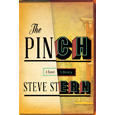Messenger
Moving past sadness and old hopes
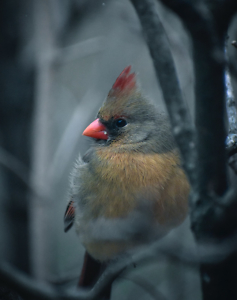 It’s said that birds are messengers from the spirit world and may even be the physical manifestation of angels. Certainly both are winged: dove as symbol of peace, eagle as power and uplift, hawk for vision and acuity, swan as life mate and transformation, raven and vulture as harbingers of death. Auguries, totems, guardians, guides — signs that bring meaning and comfort beyond our flesh-and-blood existence, especially when a loved one has passed.
It’s said that birds are messengers from the spirit world and may even be the physical manifestation of angels. Certainly both are winged: dove as symbol of peace, eagle as power and uplift, hawk for vision and acuity, swan as life mate and transformation, raven and vulture as harbingers of death. Auguries, totems, guardians, guides — signs that bring meaning and comfort beyond our flesh-and-blood existence, especially when a loved one has passed.
I needed a messenger this morning, in the kitchen where my former mate and I had shared meals and talk for 24 years. He had passed 5 days before of a heart attack. I’ve mourned our parting over the last 7 years and am largely free of sadness, through hard spiritual and emotional work to create a life that is mine alone. Still, a strange and difficult time. I knew he would visit me, just as I know my father leaves pennies in my path or in garden soil and my grandmother leaves white feathers — as guidance and reassurance of their presence.
A thunk at the glass door startled me, then I saw her on the back stoop. Everyone loves the male cardinal, a bright berry on snowy branches, but I’m also drawn to the female — muted, soft hued, gray with brushes of russet. I gathered her in a dishtowel, hoping against hope to save her. I’ve saved others stunned by the glass before, blowing into their beak and face until they could catch their own breath after the blow, revive, and stir again into flight.
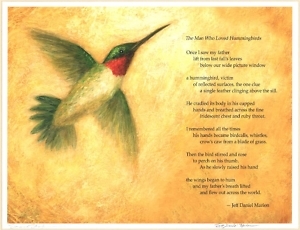
Poetry taught me this lifesaving trick. In a beautiful poem by my then-husband, “The Man Who Loved Hummingbirds,” he wrote how his father revived a dazed hummingbird by blowing on its ruby throat and iridescent chest, “victim / of reflected surfaces.” But this curled victim with her lovely fanned tail and still-warm breast was past revival, her neck broken and lolling side to side. In my hand, another life weighed equally, once shared and now apart in finality. All I could think to say as I cradled and stroked her was, “I’m sorry. I’m so, so sorry.”
What was her message? That beauty always dies, no matter how we might wish otherwise? What is it to be past grief and yet be reminded of it everywhere we look, every breath we take? Thunk at the door, thunk at the window. Parents, lost love, broken dreams, the polarized world more splintered every second. And yet. We do move past sadness and old hopes. We gather the shreds of leftover nests and rebraid them, slowly but surely — over, under, around, and through. Even if our hearts are burst or burdened at the end, we take the love we gave and were given with us across the bar into a shining frontier.
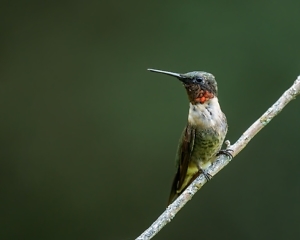
A friend says that everything is a message, if only we open our eyes and ears. In that sense, we’re all messengers, not saying, “I’m sorry,” but wake up to this moment, and this, and this. It’s up to me to focus not on mutual failings or even greatness, but on the complex fusion we all are. To lightly perch on the gone, the passing, and the coming, all of it exquisitely impermanent. To read the signs dropped at my feet and swerving high in the air, so alive with the possible, so humming with change.
Later that day, I stood at the same door. A male cardinal came and sat on the garden railing for the longest time, watching me through the glass. Is he now without his mate? She who died so quickly and completely in a heartbeat? Then an emerald hummingbird zipped by, from the spirea to the bronze fennel, drinking all the nectar he could for the arduous winter migration from Tennessee to Mexico, his fierce little fist of a heart pounding like there was no tomorrow.
*© Suzanne Stryk. Used with permission.
“The Man Who Loved Hummingbirds” by Jeff Daniel Marion.
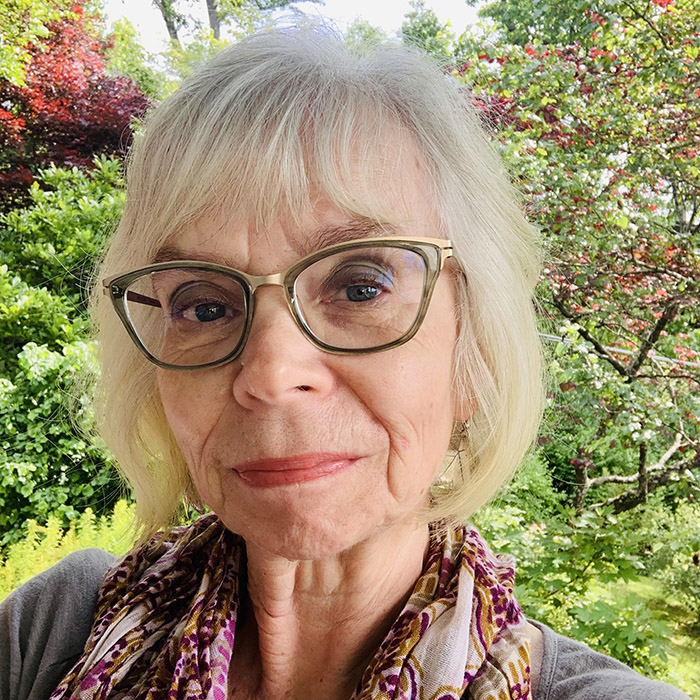
Copyright © 2021 by Linda Parsons. All rights reserved. Linda Parsons is a poet, playwright, and the copy editor for Chapter 16. She is also the poetry editor for Madville Publishing. She writes and gardens in Knoxville, and her fifth poetry collection is Candescent (Iris Press, 2019).


